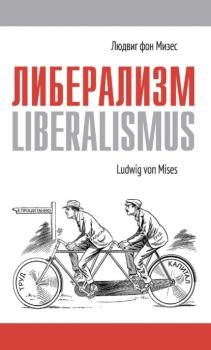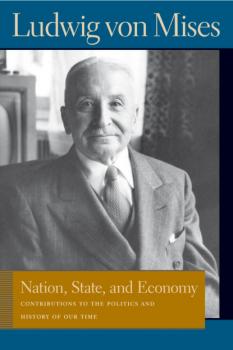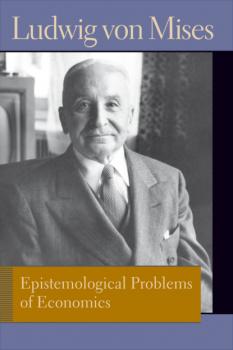Людвиг фон Мизес
Список книг автора Людвиг фон МизесПолитическая экономия войны и мира
В ходе анализа осуществимости и работоспособности трех мыслимых систем общественного сотрудничества – либерализма, социализма и интервенционизма (совокупности изолированных мер государственного регулирования экономики) Л. фон Мизес выбрал подход, который, по его мнению, «только и делает возможным научное исследование политических вопросов». Теории, разработанные им на основе этого подхода, он считал неопровержимыми. В статьях, включенных в настоящий сборник, автор применяет эти теории к анализу политических проблем в 1920—1940-х гг. в Западной Европе, США и развивающихся странах. В межвоенный период политикой правили идеи экономического национализма, стремление к автаркии и протекционизм. После Второй мировой войны главной задачей Европы стало обеспечение прочного мира – как между крупными странами, так и между почти двумя десятками государств на Балканах и в Дунайском регионе. В формате PDF A4 сохранен издательский макет книги.
Регулирование экономики и бюрократия
В серии монографий и статей, опубликованных с 1922 по 1929 г. Л. фон Мизес провел всесторонний анализ проблем общественного сотрудничества. В них рассмотрены все теоретически представимые системы сотрудничества – социализм, либерализм и интервенционизм (государственное вмешательство в экономику) – и оценивались их осуществимость и эффективность. В настоящем сборнике представлены серия статей, опубликованных в 1923—1929 гг., и монография, написанная в 1940 г., посвященные анализу проблем изолированных мер государственного регулирования экономики, – интервенционизму. В небольшой, но насыщенной идеями монографии «Бюрократия» автор сравнивает две формы управления – бюрократическую и основанную на информации и стимулах свободного рынка. Это был первый систематический экономический анализ деятельности правительственных органов, выявивший присущую им тенденцию увеличиваться в размерах и стремление к расширению своего влияния даже в том случае, если их деятельность не приносит социальной и экономической пользы. Предупреждение против этатизма смешанной экономики вовремя не было услышано. Написанная задолго до того как экономисты школы общественного выбора занялись этим предметом, книга описывает бюрократию как одновременно преследующую собственные интересы и экономически иррациональную. Правительство невозможно изобрести заново и построить на каких-либо иных принципах: если для выполнения каких-то функций требуется правительство, то выполнять эти функции будет бюрократия, не способная действовать эффективно. Максимум, что можно сделать в этих условиях, это ограничить сферу деятельности правительства как можно более узким кругом вопросов. В формате PDF A4 сохранен издательский макет книги.
Нация, государство и экономика. О политике и истории нашего времени
В 1919 г., сразу после своей последней командировки на фронт, где он служил командиром артиллерийской батареи, Людвиг фон Мизес решил исследовать причины и последствия войны, разрушившей старую Европу. Первоначально автор хотел назвать эту книгу «Империализм»: она состоит из трех очерков по теории империализма, иллюстрируемой на примерах из истории Германии и Австро-Венгрии. В первой главе для объяснения германского империализма, в котором он видел главную причину войны, Мизес провел анализ «политической экономии наций». Во второй главе критикуется мнимая благотворность немецкого военного социализма, а в третьей препарируется история и политика немецких социал-демократов. Несмотря на специфическую природу обсуждаемых исторических событий, все положения и оценки, выдвигаемые автором, для многих стран становятся только актуальнее. Как и предполагал историк Рудольф Зигхардт в 1932 г., спустя сто лет Австро-Венгерская империя стала «мертвой буквой» и все ее битвы и страдания для современных людей не значат ничего, но проблемы, которые так мучительно пыталась решить эта империя, остались нерешенными. Они вновь и вновь возникают повсюду в мире, и еще долго будут занимать умы везде, где национальные меньшинства борются за продолжение существования своей культуры, или, точнее, по Мизесу, где в условиях массовой демократии и всеобъемлющего вмешательства государства в экономику ограничиваются права меньшинств пользоваться родным языком в политической жизни. В формате PDF A4 сохранен издательский макет книги.
Либерализм
Впервые опубликованный в 1927 г., «Либерализм» Людвига фон Мизеса представлял собой решительную попытку отвоевать либеральный бренд у присвоивших его «социального либерализма» в Германии и «нового либерализма» в Англии. Книга стала итоговой частью (выводами для экономической политики) проекта автора по теоретическому исследованию работоспособности всех представимых экономических систем – социализма, интервенционизма и экономики свободного рынка (капитализма). Здесь автор впервые привел программу классического либерализма в систему: из исторически сложившегося сочетания разнородных элементов он создал неделимое и неразрывное целое, в котором все части взаимно обусловлены и расположены в иерархическом порядке, – с учетом новейших на то время открытий экономической теории и социологии (в значительной мере сделанных самим автором). До сегодняшнего дня «Либерализм» остается единственным систематическим изложением принципов либерального устройства общества и государства, основ либеральной экономической и внешней политики. Автор утверждает частную собственности на средства производства в качестве центрального принципа либерализма и демонстрирует тесную связь между свободным рынком, международным миром, гражданскими правами и экономическим процветанием.
Человеческая деятельность. Трактат по экономической теории
Людвиг фон Мизес (1881—1973) – один из величайших мыслителей ХХ века, австрийский экономист и обществовед. С 1940 г. жил и работал в США. Книга представляет собой систематическое изложение экономической науки от самых основ до экономической политики, включая эпистемологию и методологию. С необходимой полнотой представлены теории ценности, экономического расчета, денежных цен и кредита, теории капитала и процента, а также разработанная автором теория экономических циклов. Всесторонне рассматриваются как рыночная экономика, так и социалистическая, а также последствия государственного вмешательства в экономику. Этим трактатом автор завершил начавшуюся в 1870-х гг. трансформацию классической политэкономии как науки об экономических аспектах человеческой деятельности и теории рыночных цен в общую теорию человеческого выбора – науку о любом виде человеческой деятельности. Для экономистов, историков, социологов и политологов, а также для всех, кто интересуется законами образования цен и ставок заработной платы, причинами экономических кризисов, факторами экономического роста и следит за колебаниями курсов валют.
Die Entwicklung des gutsherrlich-bäuerlichen Verhältnisses in Galizien (1772-1848)
"Die Entwicklung des gutsherrlich-bäuerlichen Verhältnisses in Galizien (1772-1848)" von Ludwig Von Mises. Veröffentlicht von Good Press. Good Press ist Herausgeber einer breiten Büchervielfalt mit Titeln jeden Genres. Von bekannten Klassikern, Belletristik und Sachbüchern bis hin zu in Vergessenheit geratenen bzw. noch unentdeckten Werken der grenzüberschreitenden Literatur, bringen wir Bücher heraus, die man gelesen haben muss. Jede eBook-Ausgabe von Good Press wurde sorgfältig bearbeitet und formatiert, um das Leseerlebnis für alle eReader und Geräte zu verbessern. Unser Ziel ist es, benutzerfreundliche eBooks auf den Markt zu bringen, die für jeden in hochwertigem digitalem Format zugänglich sind.
Nation, State, and Economy
Essential to Mises’s concept of a classical liberal economy is the absence of interference by the state. In World War I, Germany and its allies were overpowered by the Allied Powers in population, economic production, and military might, and its defeat was inevitable.Mises believed that Germany should not seek revenge for the peace of Versailles; rather it should adopt liberal ideas and a free-market economy by expanding the international division of labor, which would help all parties. “For us and for humanity,” Mises wrote, “there is only one salvation: return to rationalistic liberalism.”Ludwig von Mises (1881–1973) was the leading spokesman of the Austrian School of economics throughout most of the twentieth century.Bettina Bien Greaves is a former resident scholar and trustee of the Foundation for Economic Education and was a senior staff member at FEE from 1951 to 1999.Please note: This title is available as an ebook for purchase on Amazon, Barnes and Noble, and iTunes.
Omnipotent Government
Published in 1944, during World War II, Omnipotent Government was Mises’s first book written and published after he arrived in the United States. In this volume Mises provides in economic terms an explanation of the international conflicts that caused both world wars. Although written more than half a century ago, Mises’s main theme still stands: government interference in the economy leads to conflicts and wars. According to Mises, the last and best hope for peace is liberalism—the philosophy of liberty, free markets, limited government, and democracy.Ludwig von Mises (1881–1973) was the leading spokesman of the Austrian School of economics throughout most of the twentieth century.Bettina Bien Greaves is a former resident scholar and trustee of the Foundation for Economic Education and was a senior staff member at FEE from 1951 to 1999. Please note: This title is available as an ebook for purchase on Amazon, Barnes and Noble, and iTunes.
Epistemological Problems of Economics
First published in German in 1933 and in English in 1960, Epistemological Problems of Economics presents Ludwig von Mises’s views on the logical and epistemological features of social interpretation as well as his argument that the Austrian theory of value is the core element of a general theory of human behavior that transcends traditional limitations of economic science.This volume is unique among Mises’s works in that it contains a collection of essays in which he contested the theories of intellectuals he respected such as Carl Menger, Eugen von Böhm-Bawerk, and Max Weber. Mises describes how value theory applies to human action at all times and places as opposed to economic theory, which applies only to a human action guided by economic calculation.In a review of Epistemological Problems of Economics that was published in Teacher’s College Record in 1965, F. A. Hayek stated, “If Professor Mises’s Human Action . . . must be regarded as the definitive statement of his views, the distinctive features of his notions of the nature of social science have found their freshest expression in the present series of essays, dating from 1928 to 1933.”Ludwig von Mises (1881–1973) was the leading spokesman of the Austrian School of economics throughout most of the twentieth century.Bettina Bien Greaves is a former resident scholar and trustee of the Foundation for Economic Education and was a senior staff member at FEE from 1951 to 1999.Please note: This title is available as an ebook for purchase on Amazon, Barnes and Noble, and iTunes.









